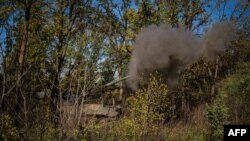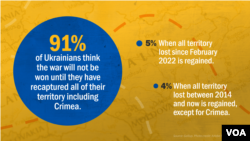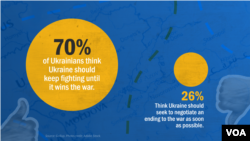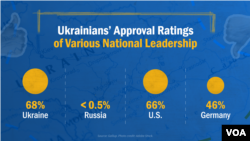A new Gallup poll released this week found that 70% of Ukrainians want to continue the war with Russia until they achieve victory, and 91% said victory means recapturing all Ukrainian territory seized by Russia, including Crimea.
The poll was conducted in September amid excitement over recent battlefield victories and before the latest wave of airstrikes against Ukrainian population centers.
The findings suggest strong support for the position of Ukrainian President Volodymyr Zelenskyy, who declared late last month that he would not pursue a negotiated end to the war as long as Vladimir Putin remains president of Russia.
Speaking soon after Putin proclaimed Russia's illegal "annexation" of four Ukrainian territories, Zelenskyy said, "Ukraine will not hold any negotiations with Russia as long as Putin is the president of the Russian Federation. We will negotiate, but with the new president."
At the time the poll was conducted, a Ukrainian counteroffensive had regained large swaths of territory in the nation's east, buoying spirits across the country. Ukrainian forces are now closing in on the key southern city of Kherson, but progress there has been slower and costly, while Russia has retaliated with a devastating series of rocket and drone attacks on civilian targets and infrastructure across Ukraine.
RJ Reinhart, a lead author of a series of reports Gallup is putting out this week based on the poll findings, said it is too early to predict what impact the Russian bombardment might have had on public attitudes.
"Even today, the Russians are targeting power plants in Ukraine with the idea of turning this into a really cold, dark winter, [in hopes that] that will encourage the Ukrainian population to essentially give up on the fight and realize that somehow the Russians will win, or at least the Ukrainians won't win," he said.
"There's another side to that," he added. "It may encourage them to fight that much harder."
Perhaps not surprisingly, the Gallup survey found that support for fighting until victory is strongest in regions farthest from the ground war and weakest in regions where people are closest to the action.
"Backing for the war effort is highest in places such as the country's capital, Kyiv (83%), and in the West (82%), Central (78%) and North (75%) regions of the country. Much smaller majorities in the country's East (56%) and South (58%) support continuing the war," Gallup reported.
"Where you've got the war right at your doorstep, your primary concern is simply stop the fighting, stop the violence that's going on," Reinhart said in a phone interview.
In addition, he noted: "You typically have the western part of the country more aligned with Europe, more aligned with the West, whereas in the east you have a population that is at least somewhat more aligned with Russia."
Nevertheless, he said, the poll shows that "you have a clear majority that supports fighting on until victory."
On a separate question about the quality of their lives, Ukrainians were unhappy with their current conditions but hopeful about the future. Asked to rate their living conditions on a scale from 1 to 10, respondents put their current conditions at an average of 4.6 but set their expectations for five years from now at 7.9.
A little more than half of the respondents told Gallup that the economic conditions in the city or area where they live are getting worse, while nearly a third reported that economic conditions are getting better.
The survey also asked respondents how they feel about the leadership of major countries including the U.S., China, Russia and Germany.
"Perception of Russian leadership has tanked, with less than 0.5% of Ukrainians now approving of Russia's leadership," Reinhart told VOA. "Views of Russia's key ally China are also quite poor; 14% of Ukrainians approve of China's leadership, down from 36% in 2021."
Views of the leadership of the United States, which has assisted Ukraine with billions of dollars' worth of war materiel and humanitarian aid, have improved dramatically. Some 66% of Ukrainians say they approve of U.S. leadership, up from just 37% in 2021.
While Germany has taken significant steps to support the Ukrainian war effort, including the shutdown of the Nord Stream gas pipeline from Russia, only 46% of respondents said they approve of German leadership, almost unchanged from the 48% who said the same thing last year.
"Ukrainians may have not shifted on Germany due to the perceived delays in substantial military assistance from the country," Reinhart said.







